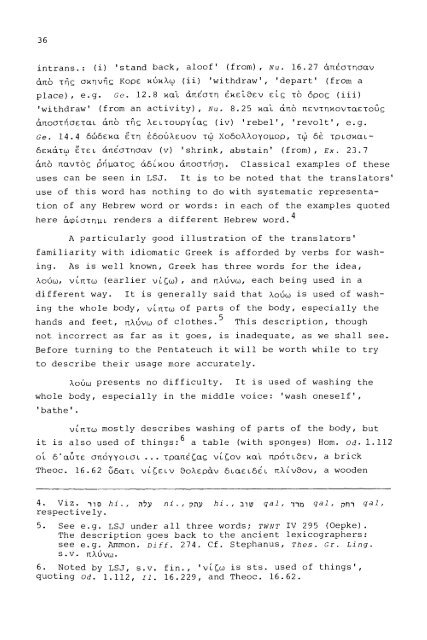A Lexical Study of the Septuagint Version of the Pentateuch
A Lexical Study of the Septuagint Version of the Pentateuch
A Lexical Study of the Septuagint Version of the Pentateuch
You also want an ePaper? Increase the reach of your titles
YUMPU automatically turns print PDFs into web optimized ePapers that Google loves.
intrans.: (i) 'stand back, alo<strong>of</strong> (from), Nu. 16.27 άπέστησαν<br />
άπο της σκηνής Κορε κύκλω (ii) 'withdraw', 'depart' (from a<br />
place) , e.g. Ge. 12.8 καΐ άπε'στη εκείθεν εις το όρος (iii)<br />
'withdraw' (from an activity), Nu. 8.25 και άπό πεντηκονταετούς<br />
άποστήσεται άπό της λειτουργίας (iv) 'rebel', 'revolt', e.g.<br />
Ge. 14.4 δώδεκα ετη έδούλευον τω Χοδολλογομορ, τω δέ τρισκαι-<br />
δεκάτω έτει άπέστησαν (ν) 'shrink, abstain 1<br />
(from), Ex. 23.7<br />
άπό παντός ρήματος αδίκου άποστήση. Classical examples <strong>of</strong> <strong>the</strong>se<br />
uses can be seen in LSJ. It is to be noted that <strong>the</strong> translators'<br />
use <strong>of</strong> this word has nothing to do with systematic representa<br />
tion <strong>of</strong> any Hebrew word or words: in each <strong>of</strong> <strong>the</strong> examples quoted<br />
here άφίστημι renders a different Hebrew word. 4<br />
A particularly good illustration <strong>of</strong> <strong>the</strong> translators'<br />
familiarity with idiomatic Greek is afforded by verbs for wash<br />
ing. As is well known, Greek has three words for <strong>the</strong> idea,<br />
λούω, νίπτω (earlier νίζω), and πλύνω, each being used in a<br />
different way. It is generally said that λούω is used <strong>of</strong> wash<br />
ing <strong>the</strong> whole body, νίπτω <strong>of</strong> parts <strong>of</strong> <strong>the</strong> body, especially <strong>the</strong><br />
5<br />
hands and feet, πλύνω <strong>of</strong> clo<strong>the</strong>s. This description, though<br />
not incorrect as far as it goes, is inadequate, as we shall see.<br />
Before turning to <strong>the</strong> <strong>Pentateuch</strong> it will be worth while to try<br />
to describe <strong>the</strong>ir usage more accurately.<br />
λούω presents no difficulty. It is used <strong>of</strong> washing <strong>the</strong><br />
whole body, especially in <strong>the</strong> middle voice: 'wash oneself,<br />
'ba<strong>the</strong>'.<br />
νίπτω mostly describes washing <strong>of</strong> parts <strong>of</strong> <strong>the</strong> body, but<br />
it is also used <strong>of</strong> things: a table (with sponges) Horn. od. 1.112<br />
οι δ'αύτε σπόγγοισι ... τράπεζας νίζον και πρότιθεν, a brick<br />
Theoc. 16.62 ύδατι νίζειν θολεράν διαειδέι πλίνθον, a wooden<br />
4. Viz. -no hi., nby ni., pny hi., mw gai, -pn gai, pni qal,<br />
respectively.<br />
5. See e.g. LSJ under all three words; TWNT IV 295 (Oepke).<br />
The description goes back to <strong>the</strong> ancient lexicographers:<br />
see e.g. Ammon. Diff. 274. Cf. Stephanus, Thes. Gr. Ling.<br />
s.v. πλύνω.<br />
6. Noted by LSJ, s.v. fin., 'νίζω is sts. used <strong>of</strong> things',<br />
quoting od. 1.112, II. 16.229, and Theoc. 16.62.

















